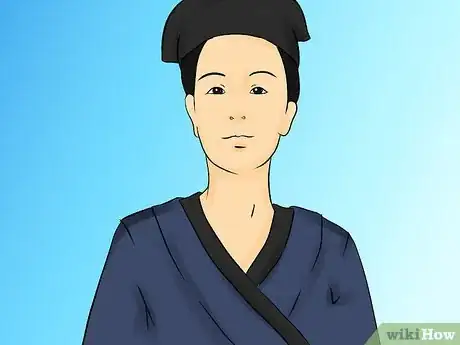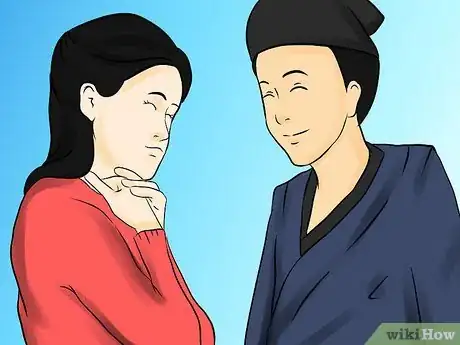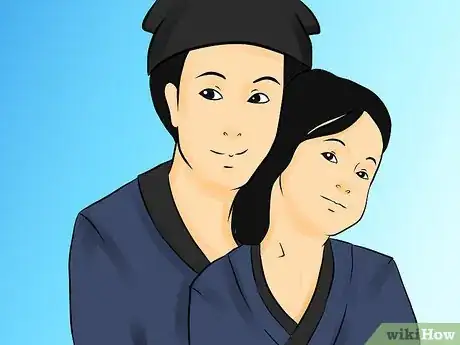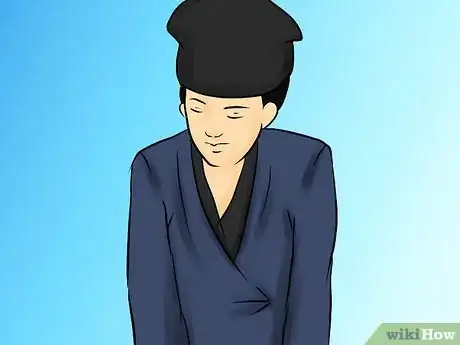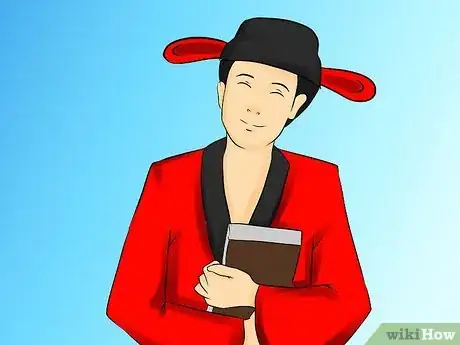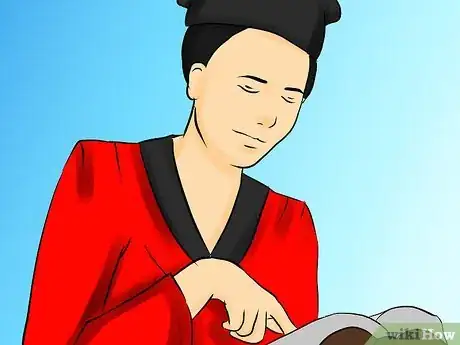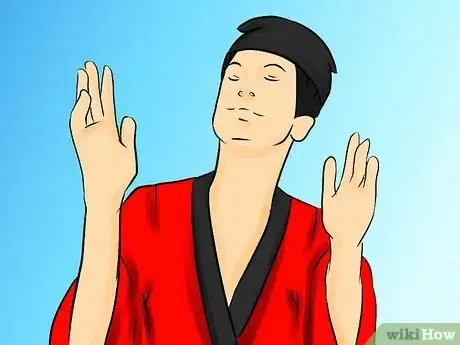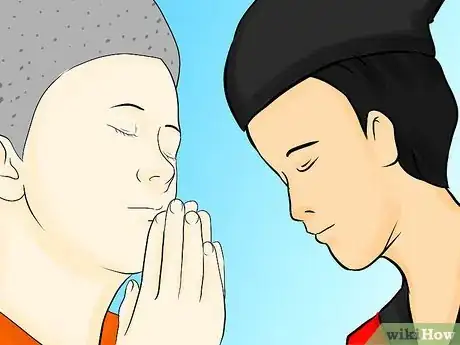X
wikiHow is a “wiki,” similar to Wikipedia, which means that many of our articles are co-written by multiple authors. To create this article, 26 people, some anonymous, worked to edit and improve it over time.
This article has been viewed 56,635 times.
Learn more...
Confucianism is more than fortune cookie advice. Confucianism is a philosophy/religion centred around the teachings of Confucius or Kung Fu-tze (551-478 BC). The teachings of Confucius focused on familial loyalty, respect for tradition and learning, combined with a Buddhist-like attempt to become enlightened. Confucianism is a major religion in Asia, especially China, Taiwan and Korea.
Steps
-
1Accept that all people, no matter what, are capable of perfection and are teachable as well as improvable. Confucianism is similar to western Humanism. You should therefore not have a pessimistic view of people, but should always be optimistic. It also means you must never chastise people for their mistakes or their ignorance, but rather show them the way and guide, not force.
-
2Do not chastise people for their mistakes. You should not worry about making mistakes, for mistakes help us by showing us what not to do. Confucius said, "Be not ashamed of mistakes and thus make them crimes."Advertisement
-
3Dedicate yourself to attaining perfection and freedom from ignorance. Like enlightenment in Buddhism, Confucius teaches how man can become a Chun-Tzu or the perfect gentlemen. That man will follow and cultivate virtue and moral perfection, they are best described as six commandments or rules of life, similar to the eightfold path or the ten commandments. However, different sects have varying numbers of commandments, usually 5,6,7,8. Most Confucian teachings have these basic precepts or tenets (all Confucians must follow these precepts):
- Li - Ritual propriety and etiquette
- Hsiao - Love within the family, love of parents and love of children
- Yi - Righteousness
- Xin - Honesty and trustworthiness
- Jen or Ren - Benevolence, humaneness towards others (this is the highest Confucian virtue)
- Chung - Loyalty to the state.
-
4Be polite. Li is better referred to as politeness and social etiquette rather than religious ritual. Confucius tried to revive past etiquette. People must therefore act consistent, being polite at all times with no deviation or lowering of standards for the sake of fitting in or out of laxity. Confucianism does have some rituals, though people can be both Confucian and of another religion like Buddhism or Taoism, they usually follow the other religion's rituals.
-
5Love your family (Hsiao). Every Confucian should love their parents and their parents should love them, unconditionally, no matter what happens. There are five bonds of Hsiao which every Confucian must follow:
- Ruler to Ruled
- Father to Son
- Husband to Wife
- Elder Brother to Younger Brother
- Friend to Friend.
-
6Practice righteousness (Yi). Righteousness should be practiced by every Confucian, it is the moral disposition to do good, people should always do what is right, which is why bravery and wisdom are often associated with Yi as it takes a wise man to know good from evil and a brave man to carry it out despite fear of death, imprisonment or humiliation.
-
7Be honest (Xin). All people should be honest and trustworthy, however Confucian Xin goes further, primarily it is integrity, one should be someone who is respectable. Xin is a major feature of the Chun-Tzu and the ruler should also have Xin, if he has Xin you must be loyal to him as part of Chung and Hsiao, though Confucius allows Citizens to overthrow rulers without Xin. Confucians are never allowed to lie, though there is a grey area when it come to white lies, so Xin and Jen to conflict in some respects.
-
8Be benevolent and humane towards others (Jen, pronounced Ren). This is the highest Confucian virtue and forms the golden rule of Confucius, 'do for others what you would like to be done to you'. This is not the same as treat others as you would wish to be treated, though similar. If you want your neighbour to cut your grass are you willing to cut his grass for him? Jen is closely associated with the precepts of Li and Yi.
-
9Be loyal to the state (Chung). The citizen should be humble, productive and obedient, the ruler should therefore be humane, just and kind to his people, though still maintaining order (similar to Plato's Philosopher kings in The Republic). Confucius allowed Citizens to overthrow rulers who were incompetent or evil, this could be considered the first avocation of a form of democracy. Therefore you have a duty to be loyal and the ruler a duty to be just.
-
10Embrace meritocracy. Meritocracy is the principle that the best, most hardworking and able people should be rewarded and the worst, laziest and least able should be overlooked.
-
11Embrace learning. Confucius once said, "Ignorance is the night of the mind, but a night without moon or stars." Ignorance is the greatest evil there is, so knowledge and wisdom are often placed among the six virtues above. Confucius also said, "Ignorance is the night of the mind, but a night without moon and star." Broker no superstition and search for truth, there are parallels with Socrates here.
-
12(Optional) Follow ancestral worship, by writing names upon a wall or something of the sort at which you pray and offer homage and respect to. Paper money and incense are burnt on special holidays.
-
13(Optional) Worship Tien (also known as Heaven). Tien is roughly the equivalent to Western notion of Providence.
-
14Embrace other religions. Do not be afraid to be both Buddhist, Taoist or Christian and a Confucian at the same time. Confucianism is a way of life and can easily accompany other religious beliefs. Confucianism goes well with Buddhism and sometimes Taoism. In fact, it is quite difficult for Buddhist and Confucian numbers to be calculated due to the large amount of overlap between the two.
Advertisement
Community Q&A
-
QuestionShould I pray to, and worship, my ancestors?
 Community AnswerSuch is an extension. Consider what your ancestors would consider respectful, and treat them thusly.
Community AnswerSuch is an extension. Consider what your ancestors would consider respectful, and treat them thusly. -
QuestionCan I be a Confucian if I am white?
 Community AnswerAlthough Confucianism has its origins in East Asia, with globalization and the spread of popular East Asian culture and media, elements of Confucianism have been embraced by individuals of all backgrounds and cultures. In China itself, there was an attempt by Muslims to reconcile Confucianism with the Quran and in the 17th century, Western culture embraced Confucianism in the agrarianism movement which arose as a way to protest absolutism and despotism. In short, righteous living does not belong to any one group but to all humanity.
Community AnswerAlthough Confucianism has its origins in East Asia, with globalization and the spread of popular East Asian culture and media, elements of Confucianism have been embraced by individuals of all backgrounds and cultures. In China itself, there was an attempt by Muslims to reconcile Confucianism with the Quran and in the 17th century, Western culture embraced Confucianism in the agrarianism movement which arose as a way to protest absolutism and despotism. In short, righteous living does not belong to any one group but to all humanity.
Advertisement
Things You'll Need
- The Analects by Confucius. A book of sayings collected after his death by his students-equivalent to the Bible or Koran, teaches on all subjects and how to act.
-
The rest of the thirteen classics. These are canonical works of Confucianism, they are:
- 1.Shijing (詩經) The Book of Poetry
- 2.Shujing (書經) The Book of Documents
- 3.Zhouli (周禮) The Rites of Zhou
- 4.Yili (儀禮) The Ceremonies and Rites
- 5.Liji (禮記) The Record of Rites
- 6.Yijing (易經) The Book of Changes
- 7.Zuo Zhuan (左傳) The commentary of Zuo
- 8.Gongyang Zhuan (公羊傳) The commentary of Gongyang
- 9.Guliang Zhuan (穀梁傳) The commentary of Guliang
- 10.Lunyu (論語) The Analects
- 11.Erya (爾雅) Luxuriant and Refined Words
- 12.Xiaojing (孝經) The Classic of Filial Piety
- 13.Mengzi (孟子) The Mencius
- A spare room or place for an ancestral shrine in which names of ancestors are recorded and paper money is burnt of special days along with incense.
About This Article
Advertisement
